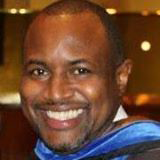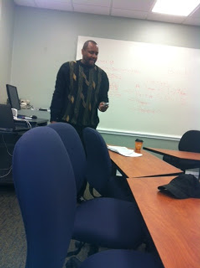
#FergusonSyllabus: The #FergusonFiasco and Teaching African American Theology
I had already completed the syllabus. The required textbook, reading assignments, videos, and other class material already assigned. Matter of fact, I had already sent the syllabus out to the students so they could get an early start on the reading. Everything was done and after my trip to the National Summit on Race in Chicago, I looked forward to having at least a couple of weeks off before the school year started. Then Ferguson happened and I knew my syllabus had to change.
This fall, I am teaching a class titled African American Religious Thought at Memphis Theological Seminary. The course focuses on the religious thinking and interpretation of African Americans—both within and outside of the Black Church or Christian tradition. The particular offering this semester focuses on published works of particular African American “theologians,” both of the systematic and public variety. In short, the class offers as a component, the religious thinking of both academic and lay theologians as they struggle to discern the sacred in and around their lives. I put particular interest on how theologies are constructed—thus creating what I have called rhetorical theology.
For the class, I assigned the Oxford Handbook of African American Theology edited by Katie Canon and Anthony Pinn. Although pricey, (yeah, that’s another post) the editors offer 34 chapters—divided into 5 sections. Also, what is a huge bonus is that at the end of each chapter, the editors offer a “selected texts” section that lists books for further reading upon the subject covered in the chapter. This is good because the bibliography covers all of the major works within African American theological thought.
With my text in hand, all I needed to do was to create the assignments. I decided that since we meet only on the first Friday of each month during the semester (September-December from 9-5pm), each meeting, except the first, students would complete an assigned reading and offer a review and reflection that the student will present to the class. In addition, students will also select one book from the “selected texts” and submit a book review and reflection.
Believing that theology is contextual and must engage the public, I also added a blogging component to the class. I expect students to make at least sixteen (16) comments on any blog post on the Rhetoric Race and Religion blog throughout the semester. Students of course are encourage to write blog posts for publication, but do not have to submit posts. However, I do expect students to engage on posts, make substantive comments, and offer theological insights on their own. For the final, the student would write a theological reflection on any subject.
However, I added just one more component—all of the reviews and reflections must now focus on what I have called “The Ferguson Fiasco.” The issues and problems in Ferguson are reminiscent of the issues and problems in the late 1960’s when, according to Canon and Pinn, “ministers and academics took a public stand against injustice and demanded a re-visioning of life in the United States that took seriously the humanity of African Americans” (1). Back then, for many African Americans, the prevailing theology of the day did not speak for or to them. Today, many are asking for a theological response to the unrest and tensions in Ferguson. With this class, I hope to move it from a merely academic pursuit of theological inquiry and place student reflection within a context that begs for a theological response. I am looking forward to our class. I am looking forward to the discussions, the papers, reflections, and yes, even the disagreements. As I engage with students, I also look forward to being challenge by students and growing in my own theological beliefs and commitments. I look forward to this class because I do believe that Ferguson will give students the creative license to do and proclaim an authentic, meaningful and purposeful theology in the public arena.
Work Cited
Cannon, Katie G. and Anthony B. Pinn (eds). The Oxford Handbook of African American Theology. Oxford Handbooks, 2014

Leave a Reply